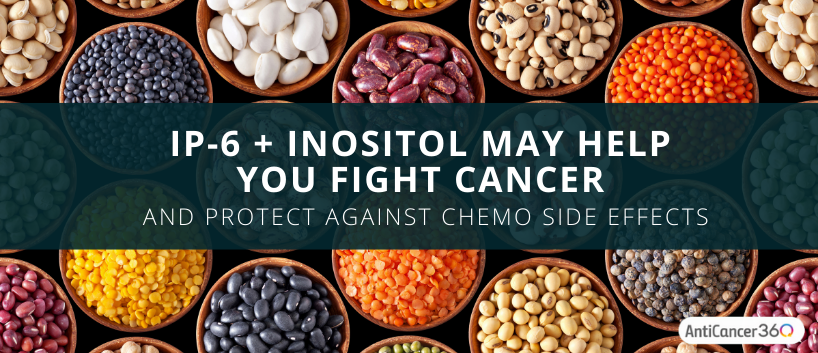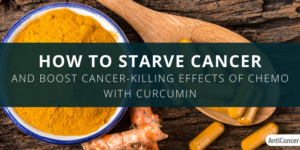When you’re fighting cancer, it’s essential to do everything you can to fuel, protect, and strengthen your body. When you consider your sleep, diet, exercise, and the medicines and supplements you take, there are many opportunities to fight cancer from multiple angles.
One strategy to fight cancer from every direction is to integrate natural substances into your anticancer plan. Many natural substances have been shown in scientific research to have anticancer benefits, including inositol hexaphosphate (IP-6) and inositol.
Overall, IP-6 and inositol supplements are considered to be safe and may have anticancer benefits. So why not consider all of the available options to help your body fight cancer from all directions? And though it depends on your particular situation, the combination of IP-6 and inositol (IP-6 + inositol) may be a valuable option for your overall plan.
In today’s post, we’re going to explain how taking this combo can possibly help you fight cancer, based on the scientific evidence of its anticancer effects.
What is IP-6?
Inositol hexaphosphate (IP-6) is a polyphosphorylated carbohydrate. It’s a form of sugar that’s had several phosphate molecules introduced and attached to it. Large amounts of IP-6 are naturally found in cereal grains, legumes, seeds, and nuts. It’s also produced in the human body. Although IP-6 is found in human and all mammal cells, it’s found in much larger amounts in plant cells [1].
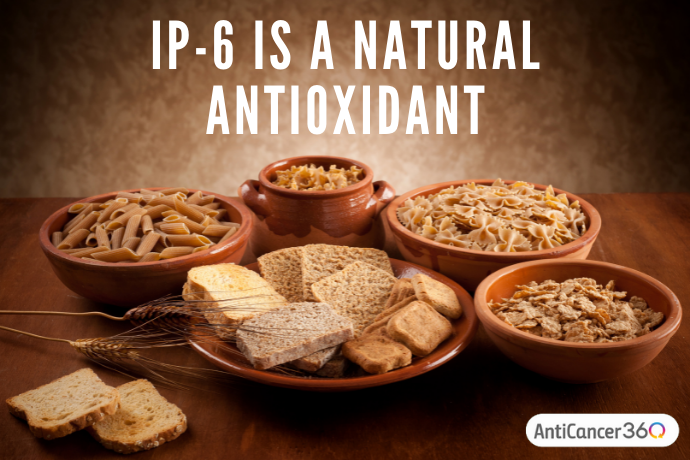
In your body’s cells, IP-6 has several important roles. It’s involved in cell signaling and proliferation. It functions to transport mRNA out of the nucleus [2]. Of special interest to us, IP-6 also chelates minerals: it physically attaches and removes minerals, such as iron, from cells. Iron and other minerals are known to contribute to the formation of free radicals. So, IP-6 is essentially a natural antioxidant.
Preliminary studies show IP-6’s chelating function might decrease the risk of iron-mediated colon cancer [3]. IP-6 research has also revealed potential anticancer benefits for other types of cancer, as we’ll continue to in today’s blog.
What is inositol?
Inositol and IP-6 aren’t exactly the same. Inositol is often grouped as a type of vitamin (vitamin B-8). It’s a sugar alcohol, and it differs from IP-6 because it doesn’t have phosphate bound to it. Like IP-6, the human body naturally makes inositol. Additional food sources include cereal grains, corn, meat, citrus fruits, and legumes [4].
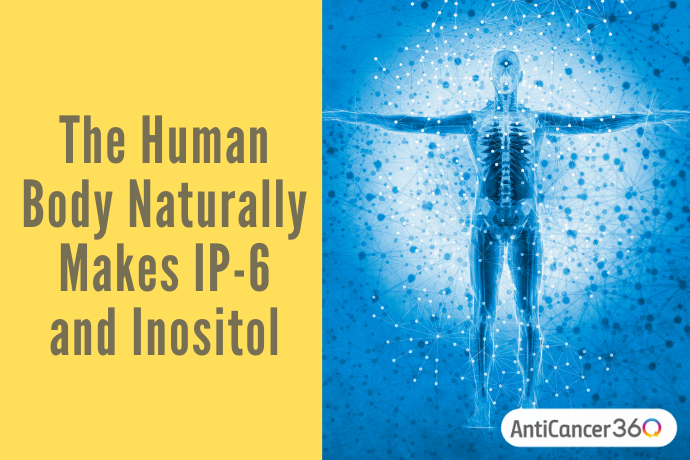
Inositol is required for cell growth, as it’s an essential component of all human cell membranes. It’s also involved in transporting fat, signaling insulin, and possibly regulating mood [5].
Why combine IP-6 and inositol?
So far, many of our blog topics have focused on a single substance. But today, we’re talking about both of these substances and their special synergistic relationship.
You’ve probably heard of “drug interactions.” Because of how some substances work in the body, they can sometimes impact the actions of other drugs or herbs. For example, an herb could increase the levels of a certain drug in your body, increasing its effects and its side effects. Or, a drug could block another drug from working, providing zero beneficial effects. Generally speaking, most interactions are undesirable, and some can be harmful.
However, synergism is a type of interaction that can sometimes be beneficial. It can be strategically used when fighting many diseases, including cancer. With synergism, combining two substances produces a more significant effect compared to when each component is used separately.
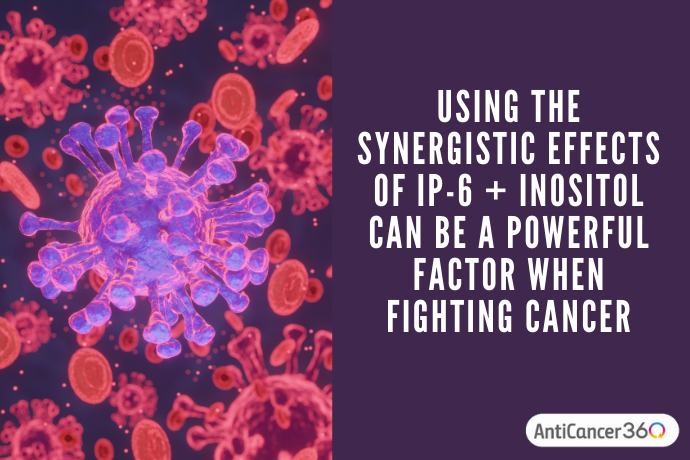
A synergistic interaction can be explained using math concepts. So, with the combination of IP-6 and inositol, it’s possible that 2 + 2 = 5. Overall, this synergism can be a powerful factor in the cancer-fighting equation. An extensive body of research shows the synergistic relationship between IP-6 and inositol, which is often designated as “IP-6 + inositol,” which we’ll use for the rest of this article.
How to Starve Cancer with IP-6 + inositol: Blocking Cancer Metabolism
Cancer metabolism refers to the processes that cancer cells use to make energy using available nutrients. So one of the critical cancer-fighting strategies is finding ways to block nutrients from reaching cancer cells… in other words, exploring how to starve cancer.
Decades of research have shown that there are many strategies to block sugar, fats, and proteins from nourishing cancer cells. These strategies involve the use of specific natural supplements and repurposed drugs to weaken cancer cells. This can make them more vulnerable to cancer treatments.
Fortunately, many natural substances show potential in blocking cancer metabolism pathways, including the combination of IP-6 + inositol.
IP-6 May Help May Hinder Metabolism in Cancer Cells
For many people, monitoring calorie intake, especially from sugar (carbohydrates or “carbs”), can be an essential strategy for general health. Over time, consuming more calories than you burn leads to weight gain and obesity, which could increase the risk of cancer and cancer progression [6],[7]., So, this is especially important for people who are fighting cancer.
Cancer cells require very high sugar (glucose) levels to satisfy their demands for rapid growth. Cancer cells can convert sugar into energy through different metabolic processes. The good news is that some natural products, such as IP-6 + inositol, can mimic many benefits of carb or calorie restriction.
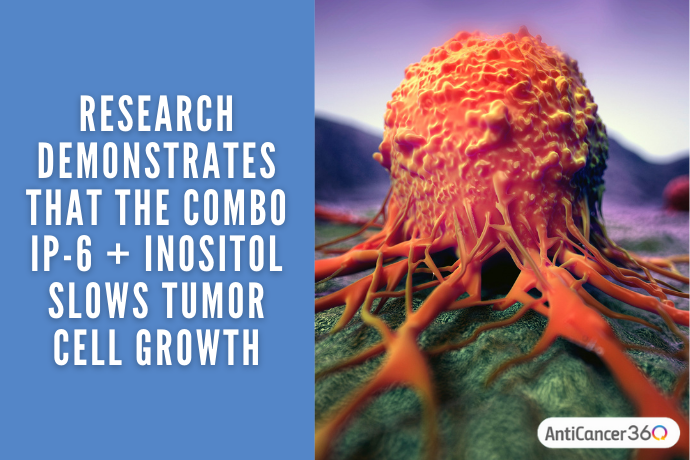
Pivotal research by Shamsuddin et al. showed that combining IP-6 + inositol in an appropriate ratio suppressed tumor growth in mice [8]. They observed that the combination produced signaling molecules that influenced metabolism and growth processes within cells.
Studies of the individual compounds have helped scientists understand how they work. Research over the last 30 years has described IP-6 as a “broad-spectrum anticancer agent.” It’s been shown to be effective against different types of cancers in various cells and tissues [9].
A study that looked at IP-6’s effects on colon cancer cells showed that IP-6 played a role in gene expression [10]. (When a gene is expressed, it means that your cells produce a protein that’s encoded by a particular gene.) This research showed that IP-6 increased the expression of certain genes and decreased the expression of other genes. These changes in gene expression led to changes in the cells’ metabolism, including limitations on the conversion of sugar into energy [11].
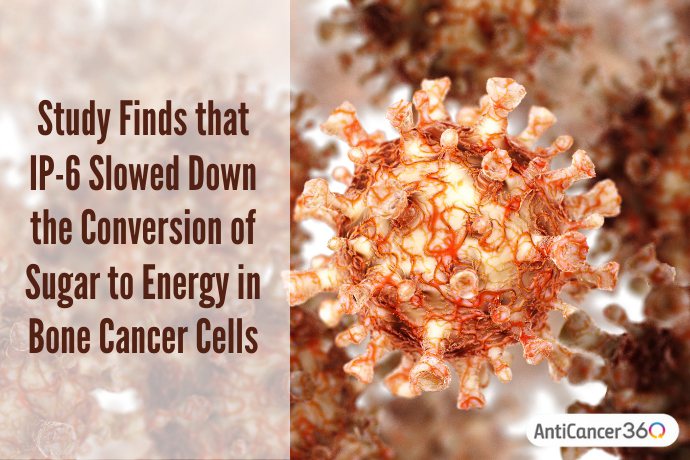
Other studies have also shown IP-6’s domino effect on cancer cell metabolism. A 2017 study looked at the effects of IP-6 on osteosarcoma (bone cancer) cells [12]. They explored the effects of IP-6 and inositol metabolism. They found that after cells were exposed to IP-6, glycolysis slowed down. (Glycolysis is a process that cells use to convert sugar into energy.)
These scientists observed that the reduced glycolysis was caused by IP-6, which created signals that then decreased the expression of certain genes. They showed that IP-6 suppressed the processes that would otherwise lead to tumor cell proliferation and metastasis (spread) [13].
Another study showed that IP-6 slowed down the growth of prostate cancer cells [14]. Their analysis revealed that IP-6 signaled the increased production of specific proteins. These proteins are involved in programmed cell death (apoptosis). IP-6 also signaled the decreased production of proteins that help cells grow and increase their blood supply. The net result was that the tumor couldn’t grow or spread, and it couldn’t build new blood vessels (a process called angiogenesis).
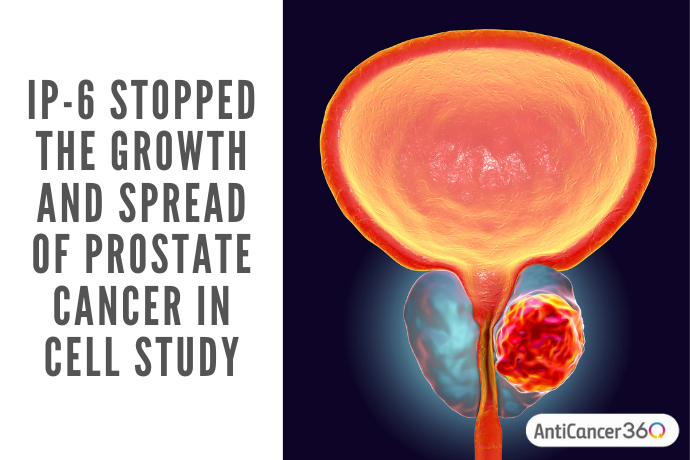
To explain these findings in simpler terms, IP-6 helps to drain energy from the cancer cells. It seems to do this by preventing crucial cell machinery from being constructed in the first place. Without the right machinery, the cancer cells can’t grow or spread as quickly. Next, we’ll look at the anti-inflammatory power of IP-6’s partner, inositol.
Inositol May Reduce Inflammation
Recent research suggests that inositol influences cell signals involved with inflammation. Inositol may synergize with IP-6’s anticancer effects by playing an anti-inflammatory role.
An inflammatory cytokine known as interleukin-6 is over-produced by most cancer cells. The high levels of interleukin-6 seem to have important roles in tumor formation and metabolism, and also function to protect cancer cells from damage. Logically, cancer researchers are interested in finding ways to block interleukin-6 or its effects [15].
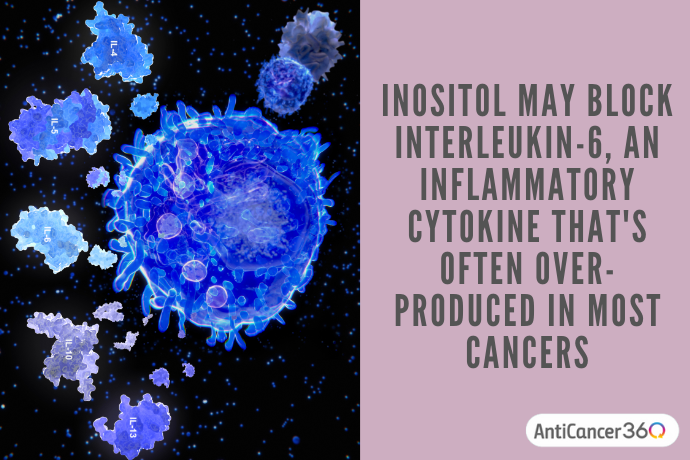
Inositol (also called myo-inositol), has been studied as an anticancer strategy for reducing the levels of interleukin-6. Researchers looked at its effects in precancerous lung lesions in mice [16]. They observed that myo-inositol exposure was correlated with greatly reduced levels of interleukin-6. Research is still ongoing to determine the clinical significance of this finding, but the results show the anticancer potential of inositol.
Now that we’ve explored how they seem to work, we’ll look at the potential benefits of integrating IP-6 + inositol with conventional cancer treatments.
IP-6 + inositol May Boost the Cancer-Killing Effects of Chemotherapy and Protect Against Side Effects
IP-6 + inositol are naturally produced by the human body. In addition to their effects on cancer cell metabolism and inflammation, IP-6 +inositol may have other anticancer benefits. Some evidence shows that IP-6 + inositol could enhance the cancer-killing effects of certain cancer treatments.
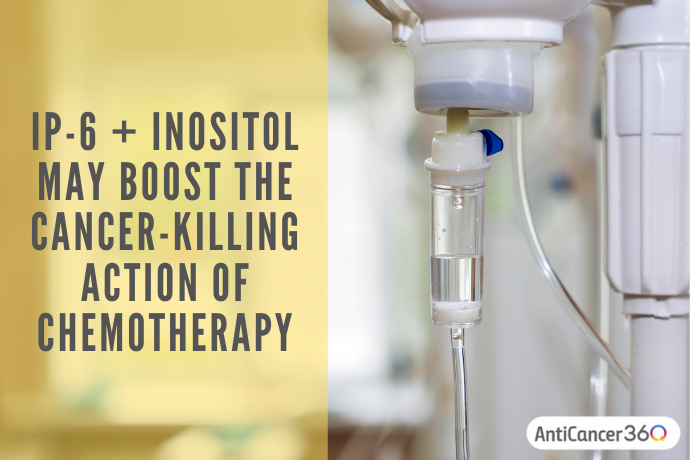
In a study that looked at human breast cancer cells, IP-6 synergistically enhanced the effects of two chemotherapy drugs, doxorubicin (Adriamycin) and tamoxifen [17].
One of the biggest obstacles with conventional cancer treatments is the risk of harmful side effects. Many chemotherapy drugs can lower the body’s production of blood cells. This can lead to major concerns, such as anemia, excessive bleeding, and/or a weakened immune system. The good news is that some natural substances have shown protective benefits as defense against some cancer treatment side effects.
Some research suggests that adding an IP-6 + inositol supplement can have protective benefits on healthy cells. There’s clinical evidence that IP-6 + inositol can help relieve some side effects of chemotherapy [18].
A small study published in 2010 compared two groups of women with breast cancer who received chemotherapy treatment after surgery. The experimental group received standard chemotherapy in addition to “low-dose” IP-6 + inositol (6 grams, divided into two doses daily). The control group received standard chemotherapy with a placebo [19]. (In this experiment, a vitamin C capsule was used as a placebo. Typically, a placebo contains no active ingredient.)
After 6 months of treatment, this study found that the experimental group (who received IP-6 + inositol) reported having a significantly improved quality of life compared to the control (placebo) group. Comparatively, the women who took IP-6 + inositol with chemotherapy gained the following benefits [20]:
- The group who took IP-6 + inositol had no drop in white blood cells. This shows that their immune system remained stronger.
- The group who took IP-6 + inositol had no reduction in platelets. This shows that they didn’t have an increased risk of bleeding.
- The group who took IP-6 + inositol had improved functional status, were better able to perform their daily activities, and enjoyed a better quality of life, based on self-reported surveys.
A 2017 study showed that a topical formulation of IP-6 gel applied to the breast was significantly beneficial for women undergoing chemotherapy for breast cancer. This study compared an IP-6 gel to a placebo gel (which contained hyaluronic acid, a moisturizer). The women were randomly assigned to apply one of the gels to the breast daily. Meanwhile, both groups received standard chemotherapy [21].
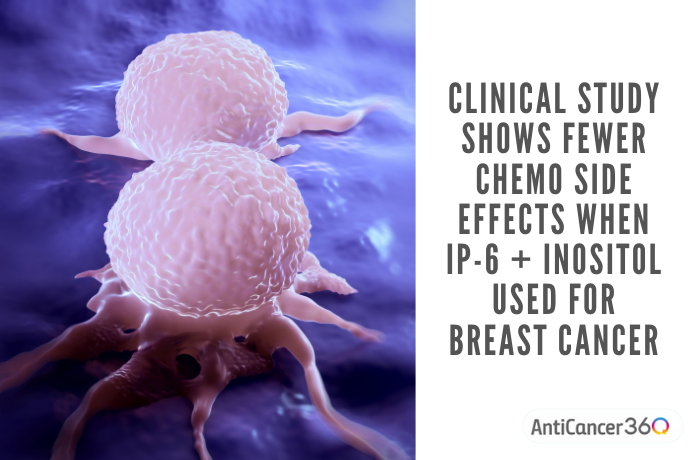
After 6 months, it was found that the group who used IP-6 gel experienced the following benefits compared to the other group [22]:
- The IP-6 gel group showed no reduction in white blood cells.
- The IP-6 gel group had no drop in platelets.
- The IP-6 gel group experienced a higher quality of life, based on a self-reported survey.
- Only 12.5% of women in the IP-6 gel group had to postpone chemotherapy sessions, compared to 37.5% of women in the control group.
So, this last finding is really interesting. Having to postpone or delay chemotherapy sessions is very common, and it can be a devastating problem. It usually happens due to people needing time for their bodies to recover from severe side effects. When chemotherapy sessions are delayed, the treatment could potentially lose effectiveness and cancer could spread.

Although this study was small, and more studies are needed, it clearly shows the supportive and protective benefits of IP-6. Suppose you or someone you love is fighting breast cancer. In that case, it’s essential to know about IP-6 (and inositol) as potentially helpful additions to your overall anticancer plan.
Next, we’ll outline what you should consider before adding these natural substances to your plan.
How To Use IP-6 + Inositol: Dosages, Side Effects, and Precautions
Dosage
For IP-6, the minimum dosage is 600 milligrams (mg) twice a day.
For inositol, the usual dosage range is 1 to 4 grams per day [23].
Some studies have used much higher doses. At 18 grams daily for 3 months, inositol was shown to be safe in adults, with minor side effects reported [24].
Another study safely used a combined 6 grams daily of IP-6 + inositol (divided into 3 grams twice a day) for 6 months.
Side Effects
Side effects with IP-6 + inositol are usually mild and temporary. The following side effects have been reported, especially during the first month [26]:
- bloating or gas
- diarrhea
These side effects may be minimized if you start with a low dose, then slowly increase it over a few days or weeks.
Interactions with Drugs and Supplements
Natural substances have the potential to interact with prescription drugs and other natural supplements. Overall, many unknown drug interactions could happen with IP-6 + inositol, especially with chemotherapy and other cancer-related treatments. The list below is by no means a comprehensive list of all possible interactions.
- Minerals, such as calcium, iron, and zinc. Avoid taking IP-6 + inositol supplements at the same time as foods or supplements that contain minerals, such as calcium, iron, or zinc. This is because IP-6 + inositol could bind to these minerals in your digestive tract and prevent them from being absorbed. So, it’s best to take IP-6 + inositol supplements at least 2 to 4 hours apart from minerals.
- Drugs or herbs with blood-thinning effects. While some studies showed that IP-6 + inositol were protective against blood-thinning side effects, other studies showed possible blood-thinner action. If you take prescription blood thinners, or other supplements that could thin your blood, you should be aware of this possibility before starting an IP-6 + inositol supplement.

Because of the risk of interactions, you must consult with your doctor or pharmacist before including any supplements in your program. Please share your updated medication and supplement list with your healthcare provider whenever a new addition is being considered.
Aggressive Integrative Approach to Cancer Treatment with IP-6 + inositol
Overall, you can see that there can be many potential benefits to adding a supplement like IP-6 + inositol to your anticancer program. When you are fighting cancer, you want every possible weapon in your arsenal.
Among other natural supplements, IP-6 + inositol’s potential anticancer effects may improve your chances of success. Depending on your situation, why not fight cancer from every possible angle, especially with complex or later-stage cancers?
Ultimately, when using an “Aggressive Integrative Approach” to cancer, the goal is to fight cancer from every possible direction. This approach includes integrating the use of natural supplements to fight cancer based on available evidence, despite limited human data… and doing so in a safe way that won’t interfere or interact with your oncology treatments.
So, make sure to discuss the risk-versus-benefit potential with your healthcare professional before starting any dietary supplements, including IP-6 + inositol.
How are you optimizing your cancer treatments? Are you taking any natural or dietary supplements? Have you tried IP-6 + inositol? Have you made any lifestyle changes that have made a key difference in your fight against cancer? Please let us know in the comments below!
Are You A Good Candidate For Our Program?
If you’d like to learn more about the AntiCancer360 approach and see if we can help you… please watch our free online webinar to learn more about our approach. Then at the end, you’ll be able to schedule a free call with someone from our team so that we can discuss your case in more detail.
Dr. Patricia Weiser is one of AntiCancer360’s consultant pharmacists, science advisors, and medical writers. Her expertise helps us create safe herbal and supplement combinations and avoid potential drug interactions.
Patricia is a graduate of the University of Pittsburgh and a licensed pharmacist. She has clinical experience in both community and hospital pharmacy. She is passionate about integrative and preventative care and strives to empower her patients to take an active role in their health.

